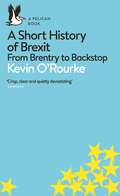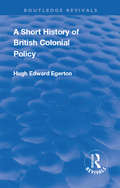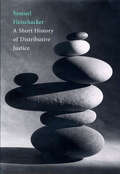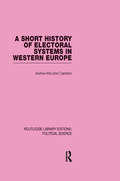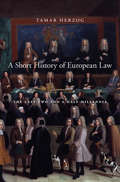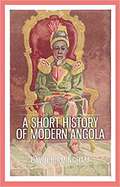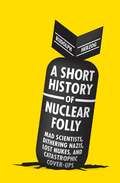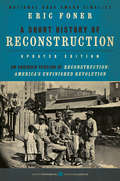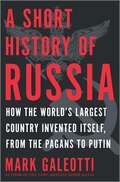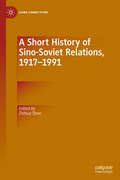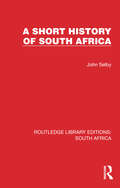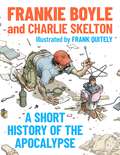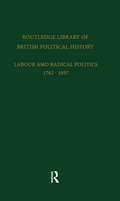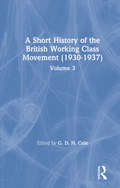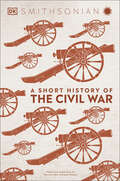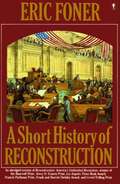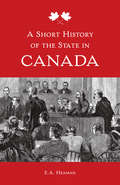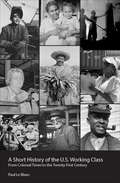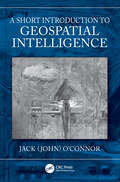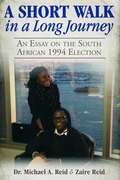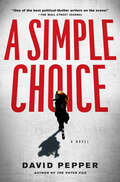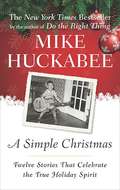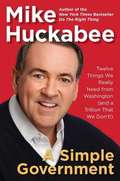- Table View
- List View
A Short History of Brexit: From Brentry to Backstop (Pelican Books)
by Kevin O'RourkeA succinct, expert guide to how we got to BrexitAfter all the debates, manoeuvrings, recriminations and exaltations, Brexit is upon us. But, as Kevin O'Rourke writes, Brexit did not emerge out of nowhere: it is the culmination of events that have been under way for decades and have historical roots stretching back well beyond that. Brexit has a history.O'Rourke, one of the leading economic historians of his generation, explains not only how British attitudes to Europe have evolved, but also how the EU's history explains why it operates as it does today - and how that history has shaped the ways in which it has responded to Brexit. Why are the economics, the politics and the history so tightly woven together? Crucially, he also explains why the question of the Irish border is not just one of customs and trade, but for the EU goes to the heart of what it is about. The way in which British, Irish and European histories continue to interact with each other will shape the future of Brexit - and of the continent.Calm and lucid, A Short History of Brexit rises above the usual fray of discussions to provide fresh perspectives and understanding of the most momentous political and economic change in Britain and the EU for decades.
A Short History of British Colonial Policy (Routledge Revivals)
by Hugh Edward EgertonThis volume discusses a short history of British Colonial policy. With all its faults the book represents much reading and some thought. In writing what is, to some extent, a history of opinion, it has been impossible altogether to suppress my own individual opinions. I trust, however that I have not seemed to attach importance to them. In dealing with the later periods, I remembered Sir Walter Raleigh's remark on the fate which awaits the treatment of contemporary history; but obscurity may claim its compensations, and atleast I am not conscious of having written under the bias of personal or party prejudice.
A Short History of Distributive Justice
by Samuel FleischackerDistributive justice in its modern sense calls on the state to guarantee that everyone is supplied with a certain level of material means. Samuel Fleischacker argues that guaranteeing aid to the poor is a modern idea, developed only in the last two centuries. Earlier notions of justice, including Aristotle's, were concerned with the distribution of political office, not of property. It was only in the eighteenth century, in the work of philosophers such as Adam Smith and Immanuel Kant, that justice began to be applied to the problem of poverty. To attribute a longer pedigree to distributive justice is to fail to distinguish between justice and charity. Fleischacker explains how confusing these principles has created misconceptions about the historical development of the welfare state. Socialists, for instance, often claim that modern economics obliterated ancient ideals of equality and social justice. Free-market promoters agree but applaud the apparent triumph of skepticism and social-scientific rigor. Both interpretations overlook the gradual changes in thinking that yielded our current assumption that justice calls for everyone, if possible, to be lifted out of poverty. By examining major writings in ancient, medieval, and modern political philosophy, Fleischacker shows how we arrived at the contemporary meaning of distributive justice.
A Short History of Electoral Systems in Western Europe (Routledge Library Editions: Political Science #22)
by Andrew McLaren CarstairsThis book provides a concise and accessible account of the historical experience of European parliaments – why different electoral systems were adopted, how they have functioned, how they have affected the development of political parties, and in what respects they have been found over time to be either suitable or unsatisfactory. The book begins with a summary of the main electoral systems, analysing and re-assessing each in the light of historical experience. The core of the book, however, is a country-by-country account of the systems which have operated in each of the main West European countries, in the context of their own constitutional, political and social developments.
A Short History of European Law: The Last Two and a Half Millennia
by Tamar HerzogTamar Herzog offers a road map to European law across 2,500 years that reveals underlying patterns and unexpected connections. By showing what European law was, where its iterations were found, who made and implemented it, and what the results were, she ties legal norms to their historical circumstances and reveals the law’s fragile malleability.
A Short History of Modern Angola
by David BirminghamThis history by celebrated Africanist David Birmingham begins in 1820 with the Portuguese attempt to create a third, African, empire after the virtual loss of Asia and America. In the nineteenth century the most valuable resource extracted from Angola was agricultural labor, first as privately owned slaves and later as conscript workers. The colony was managed by a few marine officers, by several hundred white political convicts, and by a couple of thousand black Angolans who had adopted Portuguese language and culture. The hub was the harbor city of Luanda which grew in the twentieth century to be a dynamic metropolis of several million people. The export of labor was gradually replaced when an agrarian revolution enabled white Portuguese immigrants to drive black Angolan laborers to produce sugar cane, cotton, maize and above all coffee. <p><p> During the twentieth century Congo copper supplemented this wealth, by gem-quality diamonds, and by offshore oil. Although much of the countryside retained its dollar-a-day peasant economy, new wealth generated conflict which pitted white against black, north against south, coast against highland, American allies against Russian allies. The generation of warfare finally ended in 2002 when national reconstruction could begin on Portuguese colonial foundations.
A Short History of Nuclear Folly: Mad Scientists, Dithering Nazis, Lost Nukes, and Catastrophic Cover-ups
by Jefferson Chase Rudolph HerzogIn the spirit of Dr. Strangelove and The Atomic Café, a blackly sardonic people's history of atomic blunders and near-misses revealing the hushed-up and forgotten episodes in which the great powers gambled with catastrophe. Rudolph Herzog, the acclaimed author of Dead Funny, presents a devastating account of history's most irresponsible uses of nuclear technology. From the rarely discussed nightmare of "Broken Arrows" (40 nuclear weapons lost during the Cold War) to "Operation Plowshare" (a proposal to use nuclear bombs for large engineering projects, such as a the construction of a second Panama Canal using 300 H-Bombs) . . . Herzog focuses in on long-forgotten nuclear projects that nearly led to disaster.Digging deep into archives, interviewing censored scientists, and including dozens of photos, Herzog also explores the "accidental" drop of a Nagasaki-type bomb on a train conductor's home, the implanting of plutonium into patients' hearts, and the invention of wild tactical nukes, including weapons designed to kill enemy astronauts.Told in a riveting narrative voice, Herzog--the son of filmmaker Werner Herzog--also draws on childhood memories of the final period of the Cold War in Germany, the country once seen as the nuclear battleground for NATO and the Warsaw Pact, and discusses evidence that Nazi scientists knew how to make atomic weaponry ... and chose not to. An unprecedented people's history.
A Short History of Reconstruction
by Eric FonerFrom the "preeminent historian of Reconstruction" (New York Times Book Review), a newly updated AND abridged edition of the prizewinning classic on the post-Civil War period that shaped modern AmericaIn this updated edition of the abridged Reconstruction, Eric Foner redefines how the post-Civil War period was viewed. Reconstruction chronicles the way in which Americans--black and white--responded to the unprecedented changes unleashed by the war and the end of slavery. It addresses the quest of emancipated slaves searching for economic autonomy and equal citizenship, and describes the remodeling of Southern society, the evolution of racial attitudes and patterns of race relations, and the emergence of a national state possessing vastly expanded authority and committed, for a time, to the principle of equal rights for all Americans. This "masterful treatment of one of the most complex periods of American history" (New Republic) remains the standard work on the wrenching post-Civil War period--an era whose legacy still reverberates in the United States today.
A Short History of Russia: How The World's Largest Country Invented Itself, From The Pagans To Putin
by Mark GaleottiA Library Journal 2020 Title to WatchRussia’s epic and dramatic history told in an accessible, lively and short form, from Ivan the Terrible to Vladimir Putin via Catherine the Great, the Russian Revolution and the fall of the USSR.Russia is a country with no natural borders, no single ethnic group, no true central identity. At the crossroads of Europe and Asia, it has been subject to invasion by outsiders, from Vikings to Mongols, from Napoleon’s French to Hitler’s Germans. In order to forge an identity, it has mythologized its past to unite its people and to signal strength to outsiders.In A Short History of Russia, Mark Galeotti explores the history of this fascinating, glorious, desperate and exasperating country through two intertwined issues: the way successive influences from beyond its borders have shaped Russia, and the way Russians came to terms with this influence, writing and rewriting their past to understand their present and try to influence their future. In turn, this self-invented history has come to affect not just their constant nation-building project but also their relations with the world.
A Short History of Sino-Soviet Relations, 1917–1991 (China Connections)
by Zhihua ShenDrawing on the rich trove of recently declassified Russian and Chinese archival materials, this history of Sino-Soviet relations in the 20th century sheds new light on key events during this period. It offers fresh insights into the role of ideology and national interests in the evolution of the complex and turbulent relationship between not just the two countries but also their respective Communist Parties. The chapters on the normalization of bilateral ties provide an in-depth analysis of divisions in the socialist camp that culminated in both its collapse and the disintegration of the Soviet Union. The book argues that 20th century Sino-Soviet relations reflected both long-standing and emerging political and geopolitical challenges facing members of the Cold War socialist camp, in particular tensions between the ideal of internationalism and national aspirations, between commitment to the principle of sovereignty and commitment to that of equality in international relations, and between inter-party relations and inter-state relations. This makes for a valuable addition to the reading lists of all those interested in the development of the relationship between two of the world’s most important countries.
A Short History of South Africa (Routledge Library Editions: South Africa #16)
by John SelbyOriginally published in 1973, this book begins with the arrival of the Europeans in South Africa. It examines the part played by the Dutch, British and Afrikaners, as well the diverse ethnic groups including the Xhosa and Zulus. The complicated period of the Difiqane or ‘Forced Migrations’ is clearly discussed as is the genesis and evolution of Apartheid. Other major events which are discussed include the advent of the 1820 Settlers, the Great Trek, the discovery of diamonds, the Jameson Raid, the occupation of land which became Zimbabwe, the Anglo-Boer Wars and the two World Wars. Accounts are given of Sharpeville and the subsequent introduction of legislation formalising separate development.
A Short History of the Apocalypse: A Times Bestseller
by Frankie Boyle Charlie Skelton*A Short History of the Apocalypse: your comprehensive guide to the challenges of Armageddon*Join Frankie Boyle (Saturday Night Swindle; Celebrity Vengeance) and Charlie Skelton (head writer: Ad Naseum; David Suchet's News Sachet) as they debrief time traveller and bon vivant from the late 21st Century, Alonso Lampe.Will humanity survive the coming cataclysm? Find out inside, along with helpful tips on cannibalism, thunderdome etiquette, and post-societal dating. How do you go about joining a militia? What will life be like in a billionaire's bunker? How will people entertain themselves in re-education camps? All these questions will be fully and satisfactorily answered.With exclusive illustrations by Hall of Fame comic artist Frank Quitely, A Short History of the Apocalypse is vital to your future survival.
A Short History of the Apocalypse: The vital guide to your future survival
by Frankie Boyle Charlie Skelton*A Short History of the Apocalypse: your comprehensive guide to the challenges of Armageddon*Join Frankie Boyle (Saturday Night Swindle; Celebrity Vengeance) and Charlie Skelton (head writer: Ad Naseum; David Suchet's News Sachet) as they debrief time traveller and bon vivant from the late 21st Century, Alonso Lampe.Will humanity survive the coming cataclysm? Find out inside, along with helpful tips on cannibalism, thunderdome etiquette, and post-societal dating. How do you go about joining a militia? What will life be like in a billionaire's bunker? How will people entertain themselves in re-education camps? All these questions will be fully and satisfactorily answered.With exclusive illustrations by Hall of Fame comic artist Frank Quitely, A Short History of the Apocalypse is vital to your future survival.
A Short History of the British Working Class Movement (1937): Volume 2
by G. D. ColeThis is volume 2 of the set A Short History of the British Working Class Movement (1937). The volumes reprinted here provide a general narrative of the history of the working class movement in all its main aspects - Trade Unions, Socialism and Co-operatives. The historical focus is upon the latter part of the eighteenth century, set against a background of economic and social history.
A Short History of the British Working Class Movement (1937): Volume 3
by G. D. ColeThis is volume 3 of the set A Short History of the British Working Class Movement (1937). The volumes reprinted here provide a general narrative of the history of the working class movement in all its main aspects - Trade Unions, Socialism and Co-operatives. The historical focus is upon the latter part of the eighteenth century, set against a background of economic and social history.
A Short History of the Civil War (DK Short Histories)
by DKExplore the fascinating history of America&’s bloodiest ever conflict. Combining expert historical insight with the eyewitness accounts of soldiers and civilians, A Short History of the Civil War offers a brilliant summary of the key events and wider context of the hostilities between North and South. Profiles of influential military and political leaders, and thought-provoking features on themes and experiences, from the evils of slavery to the treatment of wounded soldiers, bring the story dramatically to life. This book also features clear timelines that give an instant overview of the developments during the tumultuous war. Richly illustrated with a wealth of original artifacts, weaponry, and equipment, photography, and maps, this unique combination of imagery provides the most accessible, episode-by-episode account ever.
A Short History of the Liberal Party
by Chris CookThis highly topical and authoritative history examines the changing fortunes of the Liberals from the landslide victory of 1906, through the divisions and decline of the interwar years, to the repeated revivals in the forty years after Orpington in 1962. This concise survey examines not only the electoral fortunes of the party (including detailed analysis of the June 2001 election) but also the personalities, policies and power base of the contemporary party in the changed political landscape of the new century. Although a book designed for students of history and politics, this timely volume will also be essential reading for journalists, political commentators and party activists; indeed all those interested in the Liberal Democrat performance in the 2001 election and their prospects as the new century unfolds.
A Short History of the Reconstruction: 1863-1877
by Eric FonerAn abridged version of Reconstruction: America's Unfinished Revolution, the definitive study of the aftermath of the Civil War, winner of the Bancroft Prize, Avery O. Craven Prize, Los Angeles Times Book Award, Francis Parkman Prize, and Lionel Trilling Prize.
A Short History of the State in Canada
by E. A. HeamanA concise, elegant survey of a complex aspect of Canadian history, A Short History of the State in Canada examines the theory and reality of governance within Canada's distinctive political heritage: a combination of Indigenous, French, and British traditions, American statism and anti-statism, and diverse, practical experiments and experiences.E.A. Heaman takes the reader through the development of the state in both principle and practice, examining Indigenous forms of government before European contact; the interplay of French and British colonial institutions before and after the Conquest of New France; the creation of the nineteenth-century liberal state; and, finally, the rise and reconstitution of the modern social welfare state. Moving beyond the history of institutions to include the development of political cultures and social politics, A Short History of the State in Canada is a valuable introduction to the topic for political scientists, historians, and anyone interested in Canada's past and present.
A Short History of the U.S. Working Class: From Colonial Times to the Twenty-First Century (Revolutionary Studies)
by Paul Le Blanc&“His aim is to make the history of labor in the U.S. more accessible to students and the general reader. He succeeds&” (Booklist). In a blend of economic, social, and political history, Paul Le Blanc shows how important labor issues have been, and continue to be, in the forging of our nation. Within a broad analytical framework, he highlights issues of class, gender, race, and ethnicity, and includes the views of key figures of United States labor. The result is a thought-provoking look at centuries of American history from a perspective that is too often ignored or forgotten. &“An excellent overview, enhanced by a valuable glossary.&” —Elaine Bernard, director of the Harvard Trade Union Program
A Short Introduction to Geospatial Intelligence
by Jack O'ConnorA Short Introduction to Geospatial Intelligence explains the newest form of intelligence used by governments, commercial organizations, and individuals. Geospatial intelligence combines late 20th century historically derived ways of thinking and early 21st century technologies of GIS, GPS, digital imaging satellites and communications satellites to identify, measure, and analyze the current risk in the world. These ways of thinking have developed from military engineering, cartography, photointerpretation, and imagery analysis. While the oldest example dates back to the early 16th century, all the ways of spatial thinking share the common thread of being developed and refined during conflicts to help military leaders make informed decisions prior to action. In the 21st century— thanks in great part to advances in digital precision technology, miniaturization, and the commercialization of satellites— these ways of thinking have expanded from the military into various other industries and sectors including energy, agriculture, environment, law enforcement, global risk assessment, and climate monitoring. Features: • Analyzes human and algorithmic models for dealing with the challenge of analytic attention, in an age of geospatial data overload • Establishes an original model— envisioning, discovery, recording, comprehending, and tracking— for the spatial thinking that underpins the practice and growth of this emerging discipline • Addresses the effects of small satellites on the collection and analysis of geospatial intelligence A Short Introduction to Geospatial Intelligence describes the development of the five steps in geospatial thinking— envisioning, discovery, recording, comprehending, and tracking— in addition to addressing the challenges, and future applications, of this newest intelligence discipline.
A Short Walk in a Long Journey: An Essay On The South African 1994 Election
by Michael A. Reid Zaire ReidA Short Walk in a Long Journey is a story about an American election observer's experience in the 1994 South African election. This election marked the beginning of democracy in South Africa with the election of Nelson Mandela as president. A Short Walk in a Long Journey is a non-fictional narrative, rewritten 19 years later relying upon the copious notes taken during the adventure and vivid memories. There are several climatic points in the story and the final section is an analysis of present day South Africa, largely based upon research done by Goldman Sachs and UBS. The title is a reference to Mandela's autobiography, Long Walk to Freedom.
A Simple Choice
by David PepperA propulsive political thriller featuring two outsiders caught up in a stunning conspiracy, filled with details and twists that only a true political insider could write.When one of the nation&’s most prestigious senators jumps from a cliff in Maine, it is no surprise that the political elite and the media flock to the story, determined to uncover what has happened--and whether foul play was involved. Palmer Knight, a fast-rising TV news correspondent, is sent to cover the mysterious death, and finds himself embroiled in a plot that goes far beyond the Senate and onto the global stage. Meanwhile, Army veteran and former Supreme Court clerk Amity Jones thought she had left the fast lane behind when she moved to Ohio to care for her cancer-stricken mother. But her dogged pursuit of a local medical mystery places bring her back to the world of politics, and ultimately into Palmer's investigation of the senator&’s death. The unlikely duo, brought together by seemingly unconnected events, soon find themselves enmeshed in a political conspiracy that reaches the highest levels of power, and places their lives—and many others—in terrible danger.
A Simple Christmas: Twelve Stories That Celebrate the True Holiday Spirit
by Mike HuckabeeThe first Christmas was a simple one. So simple that it had all the makings of a first-class disaster. It's a miracle it turned out well at all. In fact, that's the whole point. It really remains, a miracle - the greatest miracle of all time.
A Simple Government: Twelve Things We Really Need from Washington (and a Trillion That We Don't!)
by Mike HuckabeeThe New York Times bestseller that offers clear solutions to the key issues facing our nation. <P> Armed with little money but a lot of common sense, former Arkansas governor Mike Huckabee surprised the nation by coming in second during the 2008 Republican presidential primaries. He connected with millions of voters by calling for a smaller, simpler government that would get out of the way when appropriate.<P> Now he's written a book that sums up the twelve things we really need from Washington to get the country back on the right track. These twelve essential truths can help us tone down the partisan rancor and return to the simple principles of the Founding Fathers: liberty, justice, personal freedom, and civic virtue.<P> Huckabee is one of the country's most popular Republicans, and his voice will carry for years to come.
